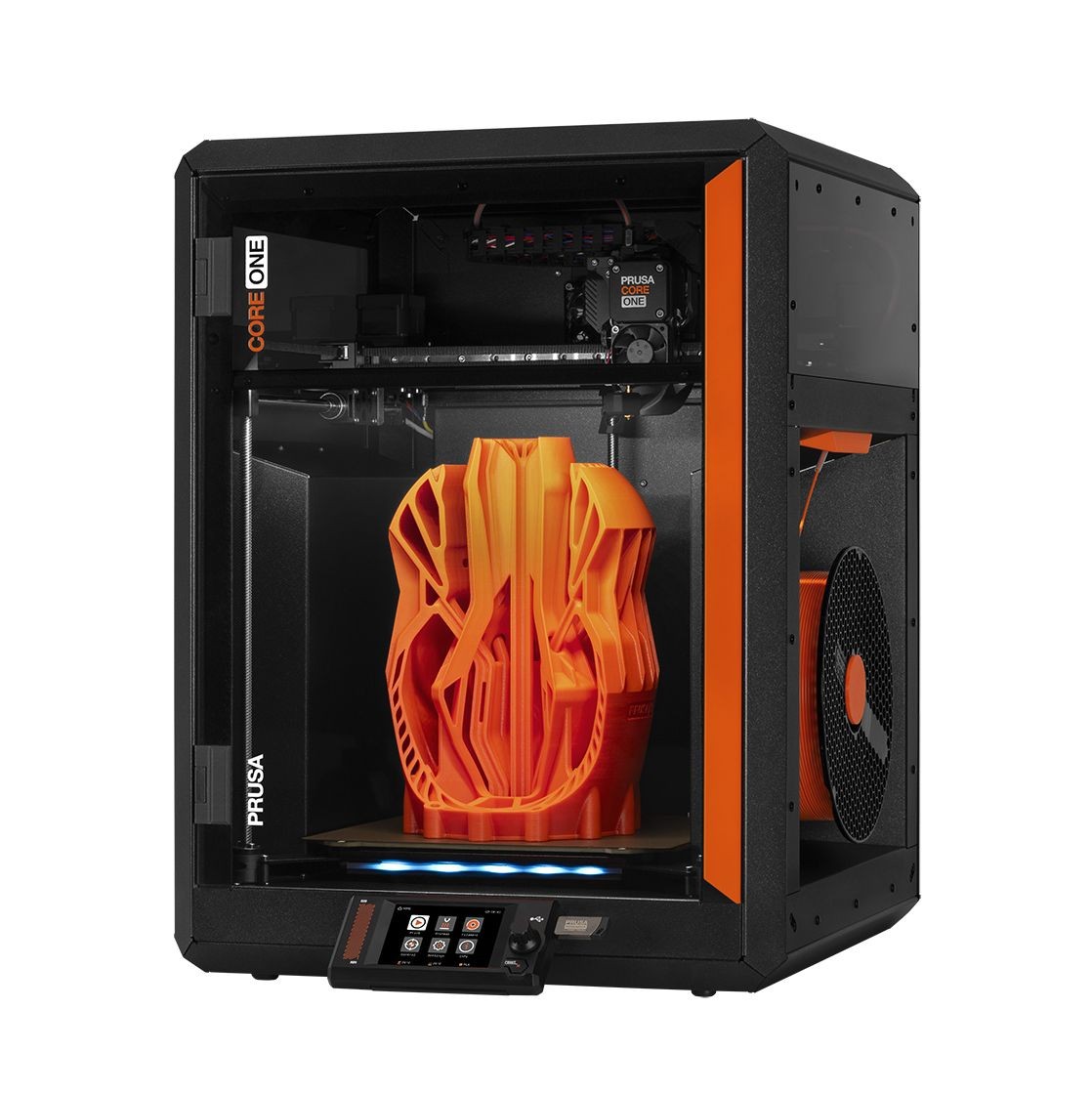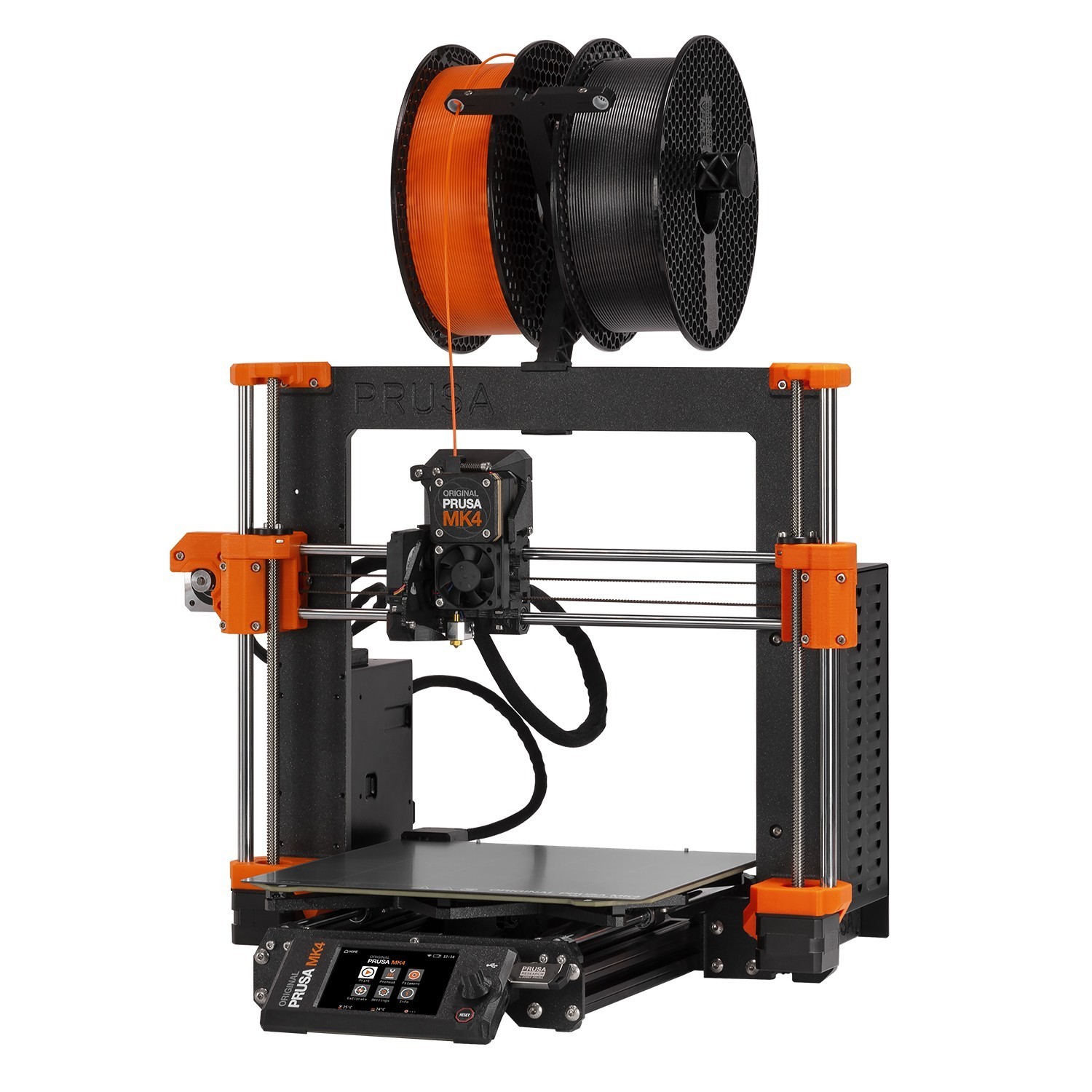Compare Core One vs Original Prusa MK4 3D Printer
Comparison between the best 3D printers
Choose the best 3D printer at the best price. The cheapest 3D printers are here.
Buy a 3D printer here with 3D Fila.
 |
 |
|
| Model | Core One |
Original Prusa MK4 3D Printer[BUY Original Prusa MK4 3D Printer] |
| Printing Material | Filament | Filament |
| Buy Filament for Prusa Core One | Buy Filament forPrusa Original Prusa MK4 3D Printer | |
| Estimated price | $1200,00 | $1099,00 |
| Manufacturer | Prusa | Prusa |
| Release Year | 2025 | 2023 |
| Print Volume [mm] | 250x220x270 | 250x220x210 |
| Printer Size [mm] | 385x340x620 | 500x400x550 |
| Weight [kg] | 14 | 7 |
| Power Loss Recovery | YES | YES |
| Enclosed printer | YES | NO |
| Bed Leveling | Automatic | Automatic |
| Filament End Sensor | YES | YES |
| Bed type | Heated | Heated |
| Power supply system | Direct Drive | Direct Drive |
| Standard nozzle | 0,4 | 0,4 |
| Maximum Nozzle Temperature [°C] | 300 | 300 |
| Maximum Bed Temperature [°C] | 120 | 120 |
| Maximum printing speed [mm/s] | 500 | 180 |
| Filament holder | YES | YES |
| Camera for supervision | NO | NO |
| Recommended filaments | PLA, TPU, TPE, HIPS, ABS, PETG, WOOD, PC, PA, PVA, ASA | PLA, ABS, PETG, PC, Nylon, Tritan, PP |
| Recommended slicers | Cura, Prusa Slicer, Orca | Cura, Simplify, Slic3r, IdeaMaker, PrusaSlicer e outros |
| Maximum Resolution [mm] | 0,01 | 0,1 |
| Processor | xBuddy 32 bit | Custom 32-bit xBuddy electronics with STM32 |
| Display | Touchscreen 3,5'' | Display touchscreen 3,5'' |
| Power Supply | 240 W | 240 W |
| Connectivity | SD | USB / Wi-Fi / internet via Prusa Connect |
| Operating systems | Windows, Linux e Macbook | Windows, Mac, Linux |
| Date of registration in the system | 2024-11-27 | 2023-06-06 |
| Release date | 2025 | 2023 |
| Extra features | The Prusa Core One is a CoreXY 3D printer featuring a robust steel frame, a 3.5" touchscreen, and a heated chamber for technical filaments. It offers 360° cooling for improved print quality and supports upgrades from the MK4S model. With a compact design, a print volume of 270x250x220 mm, and compatibility with the MMU3 for multi-color printing, it stands out for its ease of maintenance, precision, and speeds up to 260% faster than the MK3S+. | The Original Prusa MK4 stands out with automatic first-layer calibration via Loadcell sensor, high-speed enabled by Input Shaper and Nextruder for precise prints. It includes quick-change nozzles, customizable UI, and Ethernet/Wi-Fi connectivity. It supports a wide range of materials, from PLA to flexibles. Equipped with a 32-bit xBuddy mainboard and precise stepper motors, it offers exceptional print quality, enhanced security, and remote printing options via Prusa Connect. |
| Support for multiple colors and materials (AMS and CFS) | YES | NO |
Notes * |
||
| Cost-benefit | 7 / 10 | 6 / 10 |
| Hardware | 5.4 / 10 | 2.8 / 10 |
| Tela | . | . |
| Print volume | 3 / 10 | 3 / 10 |
| Performance | 4 / 10 | 1 / 10 |
| [BUY Original Prusa MK4 3D Printer] |
Conclusion |
| In conclusion, both the Core One and Original Prusa MK4 represent excellent choices in the realm of 3D printing, but they cater to slightly different user needs and preferences. The Core One, while priced higher, offers a substantial advantage in features such as a heated enclosed chamber, enhanced print volume, and support for a wider variety of materials and upgrades. It excels in performance, reporting up to 260% faster speeds and superior print quality due to its robust design and advanced cooling system. Furthermore, it supports multi-color printing, making it a versatile option for users looking to experiment with intricate designs. On the other hand, the Original Prusa MK4, while more economical, delivers dependable high-quality prints bolstered by innovative features like automatic first-layer calibration and connectivity options. Its compact footprint, despite a slightly smaller maximum print volume, allows for easy integration into various environments, though it may fall short for users needing extensive materials compatibility. Ultimately, the choice between these two 3D printers should hinge on specific use cases, budget constraints, and the desired balance between advanced features and reliability. |

